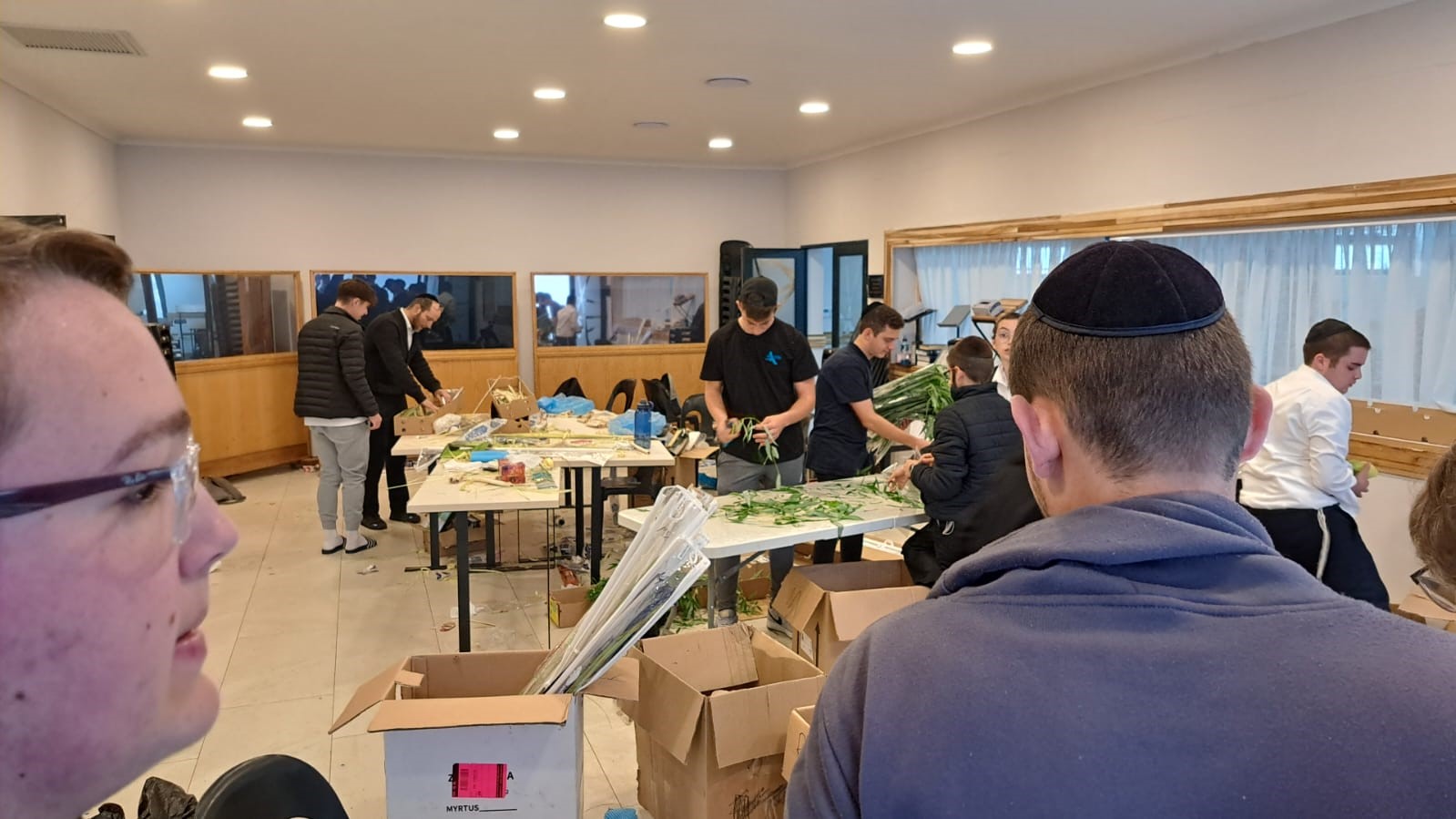click to dowload our latest edition
CLICK HERE TO SUBSCRIBE TO OUR NEWSLETTER


Published
7 months agoon
By
Nicola MiltzThe eagerly anticipated festival of Sukkot was thrown into crisis last week as Johannesburg Jewry grappled with a dire shortage of lulav and etrog sets.
Hundreds of celebrants endured lengthy queues outside the few available suppliers, with lines snaking around street corners in Glenhazel. As the days inched closer to Sukkot, anxiety mounted among those who had taken the annual availability of these essential symbols for granted.
The lulav and etrog sets complete one of the central observances of the joyous holiday, which involves holding together four plant species specified in the Torah. Every day of Sukkot (except Shabbos), one holds together a lulav (palm frond), an etrog (citron fruit), hadasim (myrtle branches), and aravot (willow branches).
Jewish unity is one of the central themes of the holiday. The four kinds of species symbolise four types of Jews, with differing levels of Torah knowledge and observance. Bringing them together represents unity as a nation.
However, at one point, unity appeared to be in jeopardy as people jostled for sets in what was described by many as a “real balagan”. The crisis prompted communal rabbonim to advocate a spirit of sharing. They then praised congregants for uniting in the face of this predicament following the broad sharing of arba minim (the four species) when it became apparent that this was the only way.
The lulav and etrog are symbolic staples of the harvest festival, but this year, they assumed added importance as the shortage struck. Notably, these cherished items come with a hefty price tag, with a kosher set commanding prices starting from about R795. When entry level sets sold out fairly rapidly and pre-ordered supplies dwindled, some individuals capitalised on the scarcity, marking up sets to exorbitant prices. To combat the scarcity, resourceful travellers even imported sets from Israel in their luggage, seeking to alleviate the shortfall, again spiking prices in excess of R1 500, sometimes higher.
Said one community member, who preferred to remain anonymous, “I usually buy six sets for my family but this year, I was allowed to buy only one set per family as the shortage became apparent. When entry level sets ran out, the prices jumped significantly to about R1 500, which is what I paid. The ones that were considered mehudar [ultra beautiful] sold for even more, I’m told.”
Or Chaim, one of the suppliers of these coveted sets through his company, the Etrog Centre, told the SA Jewish Report that the shortage could be traced back to another outlet that stopped supplying sets this year. In spite of proactive efforts to urge people to order early, Chaim said the community’s response was sluggish.
“We put out pamphlets, flyers, posters, and social media notices to encourage early orders so we could gauge our needs,” he said. “In the end, we ordered 10% more than in previous years to ensure an ample supply. However, this fell short of what was required. At the eleventh hour, we managed to secure an additional 80 sets, which alleviated the situation. We also provided free sets to some synagogues to help them. Considering the circumstances, I believe it all ended well.”
One woman voiced her dismay, saying, “I visited a shop on three separate occasions to purchase my set, but each time, I had to leave due to the stagnant queues and my other commitments. In the end, I gave up. This marks the first time in 25 years that my family didn’t have our own lulav and etrog.”
Owners of Sukkahmart, a longstanding institution that has supplied the community with lulav and etrog sets for the past 40 years, notified the community several months ago that it would no longer offer these perishable items. Instead, the owner, Rabbi Yehoshua Levy, opted to shift the company’s focus toward expanding its operations in the United Kingdom (UK), where it had been successful.
Said Levy, “I have loyally supplied the South African community for the past 40 years, starting in 1982. Over the years, I made sure that everyone who wanted a set got one. It’s a small family business, and we developed branches in the UK, Canada, Australia, and other places. The UK venture was successful, and my presence was required there to support operations. Thus, it was decided to continue selling hardware, such as sukkahs and schach in South Africa, but cease supplying the local community with perishable goods, knowing that there were about three other suppliers who could handle it. I notified the community six months ago that I wouldn’t be selling perishables this year.
“Sukkahmart hasn’t closed down,” he said. “It remains a vibrant company. We’ve had a good run this year. We just decided a while ago not to supply perishable goods.”
Levy shed light on the challenges of supplying these sets, citing their expense and the rigorous demands they imposed, including special permits and applications.
“These sets have a limited lifespan once they’ve been cut,” Levy said. “They are sourced from Italy, Morocco, and Israel, and require cold storage and very careful handling. After yomtov is over, anything not sold becomes a loss.” While acknowledging this year’s shortage, he’s optimistic the situation will be resolved by next year.
Meanwhile, the departure of Sukkahmart left a gaping void in the local market, creating a frenzy among the community. The shortage threatened to disrupt the much-anticipated joyous holiday, with hundreds of people enduring lengthy queues outside the Etrog Centre in Glenhazel.
Nevertheless, it remains united and hopeful that this year’s challenges will pave the way for a more robust and resilient supply in the future.
